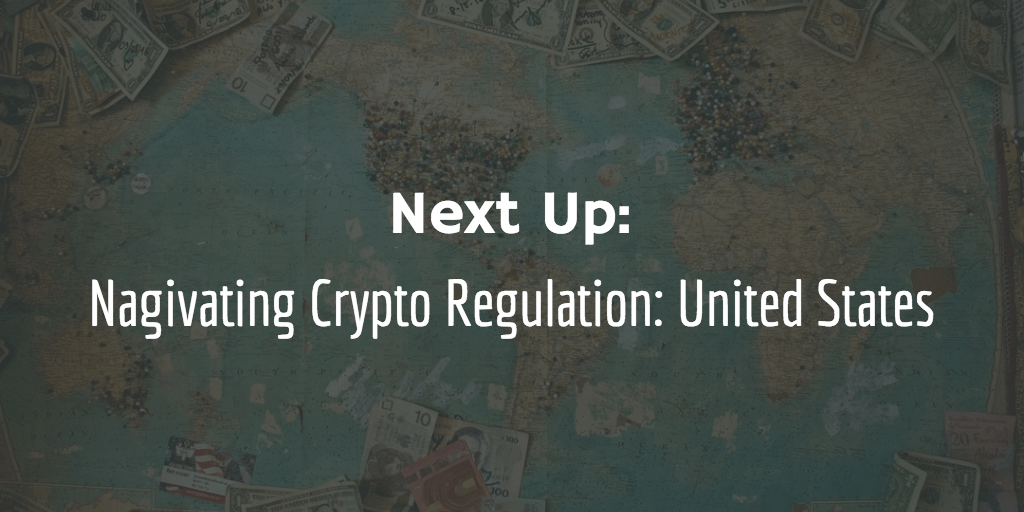Latest news about Bitcoin and all cryptocurrencies. Your daily crypto news habit.

By Alex Paley
How hot is blockchain right now? 🔥 En Fuego. And if you are like most individuals or businesses today, you are currently dancing shirtless with reckless abandon around this proverbial fire watching the flames grow. But as with all fires that get too big, at some point, they must be contained — or should we say, regulated.
Let’s start with a scenario…
You are an individual or company, looking to do one of the following:
- Buying crypto (fiat-to-crypto)
- Issuing crypto
- Trading crypto (crypto-to-crypto or crypto-to-fiat)
- Accounting for crypto-related Gains or Losses
What is your tax liability and how does it differ across key jurisdictions including the US, Russia, China, and Mexico?
If you are confident you know the answer to this question, read no further. But if you don’t or aren’t sure, then it’s time to put your shirt back on and read on.
It is no secret that all things cryptocurrency-related are operating in a legal grey area. From tax law to securities law to anti-money laundering laws to data protection, countries around the world are beginning to or have already taken a stance on how these legal areas should affect those with exposure to crypto. But with new regulations forming and evolving so quickly, it’s tough to keep up, especially when different countries continue to take vastly different stances.
This is where we come in. We have examined crypto regulations and policy developments in key jurisdictions around the world including the US, Mexico, Russia, China, UK, Switzerland, and Malta. By the end of this series, we aim to provide solutions to real-life scenarios that you may face as an individual or business that wants to be a first mover in the blockchain world.
For this introductory piece, we will start by first defining some of the key terms in blockchain law and finally introduce you to the regulatory issues and scenarios that we plan to explore throughout this series. You would be surprised how many “experts” still confuse the basics, so let’s start with a deeper understanding of some core concepts.
💰 Coins vs. Tokens
Before we go into the key differences between a Token vs. Coin, let’s define what makes a currency a currency. A Currency is traditionally defined as a:
- Medium of Exchange: something that people can use to buy and sell from one another; without money, we would be forced to rely on a barter system
- Unit of Account: something used to provide a common base for prices in order to measure and compare the relative worth of goods and services
- Store of Value: something used to retain value for use at a future time
Coins are generally used in the same way as a real-life currency — money. Aside from their monetary use, there are no other uses for “cash only” coins such as Bitcoin, Litecoin, and Monero. There are, however, other Coins that have useful features in addition to simply being a medium of exchange, such as Ethereum (smart contracts and ICOs) and VeChain (supply chain management).
We can deduce, however, that the commonality of all Coins, and their defining feature, is that they all possess their own independent blockchain.
Tokens, on the other hand, typically reside on top of another blockchain. Tokens are a representation of a particular asset or utility, or sometimes both — they can represent nearly any asset that is fungible and trade-able, from file-sharing credits (FileCoin) to excess CPU power (Golem). These Tokens with independent functionalities are often considered utility tokens. Tokens are also created and distributed primarily as a fund-raising mechanism through an Initial Coin Offering (ICO), unlike a Coin which is generally “created” through a consensus algorithm such as Proof of Work or Proof of Stake.
Whether the ICO issues a security token or a utility token can expose the company to legal registration requirements that can be extremely burdensome and expensive.
📈 Initial Coin Offerings (ICO)
In 2017, ICOs raised approximately $5.4 billion, a figure which has already been surpassed in the first quarter of 2018, which has seen fundraising at $6.3 billion. An ICO is first and foremost a crowdfunding mechanism. Blockchain-based companies that hope to seed their project will do so by creating their own token and selling it through an ICO. The tokens can have an independent utility that will allow them to interact with the final project, such as Golem, or they can be a pure security or investment contract, such as the DAO tokens.
Utility tokens gained traction initially as a means to avoid compliance with securities regulation. For the most part, they are not designed as investments and if properly structured, there is a possibility that this feature may exempt them from jurisdictional laws governing securities. On the other hand, a security token that derives its value from an external, tradable asset, will be subject to securities regulations. In most jurisdictions, if an investment opportunity is considered a security, the company must issue shares through an IPO, a much more legally and financially burdensome process than through an ICO.
IPO vs. ICO Requirements
Initial Public Offering Initial Coin Offering Prospectus — detailed documentation is required to issue shares to the public and must meet specific transparency standards. White paper — there is no requirement to offer a white paper. Disclosures — key information about the company, company directors, the upcoming IPO and the company finances must be disclosed to regulatory bodies and the public. No Disclosures — there is no requirement to provide any details about the project. Ongoing reporting — after the offering, the company must provide regular updates on financial statements, accounting and taxes. No Reporting — after the offering, a company is not obliged to provide token purchasers with updates on their project and finances. Limited access — offerings are often limited to accredited investors or institutional investors. Public Access — there are generally no limits on who can purchase tokens.
While ICOs may seem like the easiest means to crowdfund a project, government crackdowns and impending future regulation means they probably won’t stay that way for much longer. Furthermore, while utility tokens were presumed to make ICOs a compliant activity due to the fact they are exempt from registration as securities, that attitude has recently shifted. While some jurisdictions still maintain that a true utility token can exist, the United States SEC has now sent 80 subpoenas to funds and issuers, putting the crypto community on notice that their tokens will be viewed as securities whether or not they have independent utility.
So what are the possible consequences if tokens are considered securities but they aren’t registered?
Private Lawsuits
If token purchasers are dissatisfied with the performance of the company or feel like they were misled by a white paper, purchasers as private actors have a right to file a class action suit for rescission (return of invested funds, with interest) based on the company’s failure to register tokens as an offering of securities with the SEC. This provision of the Securities Act is “strict liability” which means that the token holders do not need to prove misrepresentation, scienter or deception to establish fraud.
Even if a class action brought on the grounds above is made by only some dissatisfied token holders, if the action is successful, ultimately all funds raised through the ICO will be declared illegal and must be returned with interest. That means that the entire project would fall apart and even satisfied investors who believed in the project would have no grounds to challenge the judgment.
SEC Enforcement
The SEC has the authority to bring enforcement proceedings against issuers of unregistered securities. The SEC can request an injunction to prevent the ICO from happening, they can fine the company if the ICO has already taken place, and they can bring criminal actions against company directors (where a judge may fine them personally and/or sentence them to jail time).
💸 Centralized vs. Decentralized Exchanges
After an ICO, the issued token is listed on one of 194 crypto exchanges. While exchanges are making a considerable amount of money by charging high listing and transaction fees, their legality is uncertain.
National securities exchanges are required to register with the government to ensure they are maintaining fair practices, such as:
- Not discriminating against purchasers or sellers
- Not fixing prices
- Not allowing insider trading
On the other hand, crypto exchanges are largely unregulated because of the current industry-wide stance that the tokens listed are not securities. As this attitude continues to shift, exchanges will ultimately be required to register with the government, especially in light of recent crackdown notices from the SEC.
One way that exchanges may avoid registration requirements is by running a completely decentralized system. So what is the difference between a centralized and decentralized exchange?
Centralized Exchanges
Centralized Exchanges set their own rules, generally hold crypto-assets in a hot wallet (they hold your funds in their own servers), control at least one private key to access the wallet, and offer exchanges between crypto and fiat (traditional currencies such as USD, GBP, etc).
- Crypto-to-Crypto (e.g. Binance) — crypto assets are stored on the exchange servers which means transactions are fast, orders can be auto-matched, and there are no liquidity issues. However, there is a central point of failure which means all funds can be stolen, lost or frozen.
- Fiat-to-Crypto (e.g. Coinbase, Gemini, Poloniex, Kraken) — most centralized exchanges that offer an exchange to fiat are required to register as money transmitters, broker-dealers, or the local jurisdiction’s equivalent. The example companies listed above all hold money transmitter licenses in the US, except Kraken — Kraken is one of the only centralized exchanges offering fiat trades that does not hold a license. It is likely that Fiat-to-Crypto exchanges will be targeted first in the crackdown for exchange registration because they have greater financial responsibility and are more likely to meet the definition of a traditional exchange.
Decentralized Exchanges
Decentralized Exchanges trade directly peer to peer through an automated process, ensure users maintain control of their funds, do not use hot wallets, do not control private keys, and generally do not exchange between crypto and fiat
- Crypto-to-Crypto (e.g. Ether Delta, Shapeshift, Changelly) — exchanges falling in this category will arguably be in the safest position. Their lack of centralized control may be sufficient to prove that they do not meet the legal definition of an exchange, and they would not require money transmitter licenses.
- Fiat-to-Crypto (e.g. Bisq) — it is rare for decentralized exchanges to offer fiat exchange because it can be difficult to maintain liquidity. It is likely that exchanges in this category would need to register as a money transmitter; however, they may avoid meeting the definition of a traditional exchange due to their lack of centralized control.
Fully decentralized crypto-to-crypto exchanges may very well avoid meeting the legal definition of an exchange. The likelihood of whether various jurisdictions will accept this premise will be discussed in later parts in this series.
😟 Tax Treatment
Whenever a cryptocurrency is bought, sold, or traded on an exchange, there are complex tax implications. Throughout the world, attitudes toward the status of cryptocurrency for tax purposes differs primarily among three stances, cryptocurrency as a:
- Property
- Commodity
- Currency
Most countries view cryptocurrency as either a Property or Commodity; the treatment as a Currency is reserved for countries who have issued their own government-backed cryptocurrencies (such as Venezuela and Estonia).
Where cryptocurrencies are treated as property (like agriculture, real estate, cars and commercial assets) and/or a commodity (like profits on stocks, bonds, and other investments), there is a possibility of incurring liability for income tax, capital gains tax, value-added-tax, or sales tax. Exactly which tax liability is incurred will depend on whether the cryptocurrency is held as a capital asset in the hands of the taxpayer. In jurisdictions where cryptocurrency is treated as property it is considered a capital asset, which means that every single transaction is taxable for either short or long-term gains. Any income made in cryptocurrency is also taxed as ordinary income tax, including income from mining.
How do we pay these taxes?
In the United States, the IRS has released limited guidance detailing how this taxation should work in practice, and the guidance applies mainly to jurisdictions viewing virtual currency as property (Canada, UK etc.) To very briefly summarize, the capital gain subject to tax is the excess of the final sale price over the cost of the virtual currency at first purchase. So, if you buy virtual currency with the intent to eventually sell it, the amount purchased and the fair market value purchase price in local fiat (USD, GBP) must be recorded at time of first purchase so you can eventually calculate the gains when a final sale is made. For day-traders, swing-traders, gamers, or anyone using crypto for everyday purposes, this is an accounting nightmare.
In 2017, the IRS subpoenaed transaction records from centralized exchange Coinbase. In their subpoena, the IRS revealed that in 2015 only 802 people filed a tax return for bitcoin-related gains or income. While virtual currency was arguably less popular in 2015, it is statistically guaranteed that more than 802 people made taxable gains on bitcoin that year. Though we don’t have 2017 data on the number of people reporting virtual currency tax liability, it is estimated that the total US tax liability for the year is approximately $25 billion.
Despite these projections, the IRS has not released any further guidance to educate people on their crypto tax burdens, and they haven’t attempted to simplify the massive administratively unworkable reporting requiremen ts. The same confusion and difficulties exist in Canada, the UK, Australia and most other developed countries.
🙌 Our Goal
Interpreting gray area crypto regulation is a minefield. As cryptocurrencies grow in popularity, anyone from the amateur investor to the small blockchain start-up to the large company experimenting with blockchain solutions, is a hairbreadth away from accidentally breaking the law.
Throughout this series, we aim to make that hair a little wider, address some frequently asked questions, and even inform some future policy decisions in the process🤞.
This article is legal information and should not be seen as legal advice. You should consult with an attorney before you rely on this information.
Originally published at tokenarcade.com on June 17, 2018.
Navigating Crypto Regulation: Introduction was originally published in Hacker Noon on Medium, where people are continuing the conversation by highlighting and responding to this story.
Disclaimer
The views and opinions expressed in this article are solely those of the authors and do not reflect the views of Bitcoin Insider. Every investment and trading move involves risk - this is especially true for cryptocurrencies given their volatility. We strongly advise our readers to conduct their own research when making a decision.




